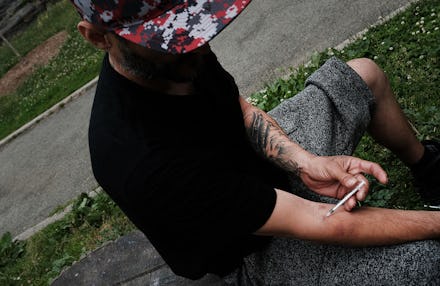This small Ohio town might stop treating heroin overdoses to save the city money

Overdose victims in a small Ohio town may be barred from receiving potentially life-saving treatment in the future, due to a controversial new policy proposal.
Last week, Middletown, Ohio, council member Dan Picard proposed a "three strikes" policy that would deny naloxone to heroin overdose victims who have been treated for overdoses twice before.
Naloxone — also known by its brand name, Narcan — is a drug used to treat victims of opioid overdoses in emergency situations. The treatment reverses many harmful effects of narcotic use, including slowed breathing or loss of consciousness. From 1996 to 2014, naloxone saved at least 26,500 lives, according to the National Institute of Drug Abuse.
Despite the noted life-saving effects of the drug, Picard said the city needs to stop providing naloxone to all overdose victims in order to keep Middletown’s budget in tact. With statewide overdoses on the rise, the town is on track to spend $100,000 this year on Narcan, far exceeding the $10,000 budgeted for the drug.
"John Smith obviously doesn’t care much about his life, but he’s expending a lot of resources and we can’t afford it," Picard told Middletown’s Journal-News.
Picard did not immediately respond to Mic’s request for comment.
Middletown's potential new policy seems to speak to a larger, nationwide issue. Since 2010, heroin-related overdose deaths in the United States have quadrupled, making drug overdoses the leading cause of death for people under the age of 50. Ohio is no stranger to this growing epidemic, with the rate of drug overdose deaths increasing by 642% from 2000 to 2015.
Picard's new plan intends to combat this trend. Under his policy, individuals who had been treated with naloxone for an overdose two times before would be required to complete enough community service to account for the costs of the drug and the emergency medical services. But after the second offense, Picard said the victims would stop receiving Narcan treatment altogether.
"The purpose of this is to scare people," Picard said. "I want people to be scared of coming to Middletown and overdosing."
However, Josh King, a psychologist and director of digital services at the Center for Motivation and Change, said stripping treatment from people on the verge of death can do more than just leave them frightened.
"People will die," King said in an interview. "It’s plain and simple. Narcan saves lives, and taking it away is going to cause people to die."
Contrary to Picard’s idea, King said taking naloxone away from overdose victims will not deter people from using heroin again in the future, as the drug is not intended to be used as a long-term treatment. Narcan is only used as a last resort in life or death situations, as it often causes narcotic users to become violently ill with withdrawal symptoms.
Instead, King said the only way to end the opioid epidemic and reduce spending on Narcan is to address the issue from the ground up.
"We don’t take away a public service that helps save lives because it costs too much," King said. "We find ways of making sure that there are public policies in place that are working with the community to help change the culture and change the understanding. We have to help people not overdose in order to have the use of Narcan go down."